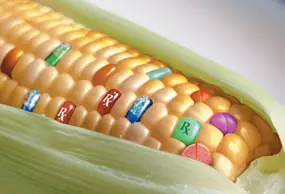Subscribe to our newsletter
- R&D&I Programmes
- Technological Services
- Consultancy Services
- Laboratory Services
- Training and Events
- Sectors


Genetically modified corn is a variety of corn whose genetic material has been altered in a laboratory using genetic engineering techniques. Unlike traditional methods, this technology allows the incorporation of specific genes from other plants or organisms to give the crop particular characteristics, such as resistance to pests or tolerance to herbicides.
Understanding the benefits of genetically modified corn is essential, since this type of crop has been developed to address some of the main challenges of modern agriculture: improving productivity, reducing the use of pesticides, or adapting better to adverse climatic conditions. For example, there are varieties of genetically modified corn that produce a protein acting as a natural insecticide, thus reducing the need for chemical treatments.
From a production standpoint, the benefits of genetically modified corn are:
Optimizes agricultural yields, which can contribute to food security.
Reduces chemical inputs such as pesticides or herbicides.
Allows more efficient crop management, enabling more sustainable farming practices.
In terms of regulation, these crops are subject to strict food and environmental safety assessments before approval. International bodies such as the World Health Organization (WHO) and the European Food Safety Authority (EFSA) agree that foods derived from currently authorized genetically modified crops are safe for human consumption. However, the social perception of genetically modified corn remains a relevant factor. In some markets, there is a growing demand for “GMO-free” products, which forces companies to assess their use strategically, considering both the technological advantages and consumer expectations.
According to the Annual Report on the Global Status of Commercialized Biotech/GM Crops published by the International Service for the Acquisition of Agri-Biotech Applications (ISAAA) in 2011, the global area of biotech crops reached 160 million hectares. In the European Union (EU), 114,624 hectares of GM crops were planted, with Spain leading Europe by cultivating 97,326 hectares of genetically modified corn. In this regard, to evaluate the risks of commercialized GM products, scientific studies are conducted to determine product safety. Below we comment on the results obtained in a recent scientific study investigating the consumption of genetically modified corn and its effects on animals used in the experiment.
Among genetically modified organisms (GMOs), the genetically modified corn K 603 stands out. It integrates a gene conferring resistance to the Roundup herbicide, which contains glyphosate. This variety is cultivated and marketed in many countries for both human and animal consumption.
Currently, a recent study published in the scientific journal Toxicology in Vitro (Elsevier) by Séralini et al., 2012, from the University of Caen in France, determined the long-term toxic effect of the Roundup herbicide and genetically modified corn tolerant to this herbicide. The research suggested that such toxicity produced alterations and tumors in the rats used in the experiments.
In Professor Séralini’s experiment, different groups of rats were supplied, over two years, with: the Roundup herbicide (whose active ingredient is glyphosate) added to corn and water at a concentration below the maximum residue level permitted for pesticides; genetically modified corn resistant to glyphosate; and, as a control, other groups of rats were fed the same corn variety but not genetically modified.
Surprisingly, the experiment’s results indicated a significant positive difference in tumor development between the groups of rats fed glyphosate in water, glyphosate-treated genetically modified corn, and genetically modified corn, compared to the control group (rats fed non-genetically modified corn).
Considering the results of Professor Séralini’s work, together with previously published data describing the negative effects of glyphosate on rat and human cells in vitro (Clair et al., 2012, Toxicology in Vitro and Gasnier et al., 2009, Toxicology), foods treated with glyphosate and even genetically modified corn resistant to this compound could be identified as an emerging food safety risk. Therefore, their impact on health and the environment should be reevaluated.
Given Professor Séralini’s findings and the growing production and consumption of GMOs, the publication spread quickly and had a significant impact, particularly in Europe, creating social alarm. This prompted food safety risk assessment institutions to urgently evaluate the methodology of the published work.
As an immediate effect of the publication, both the German Agency and the European Food Safety Authority, at the request of the European Commission, reviewed the recently published article on the potential toxicity of genetically modified corn and Roundup herbicide containing glyphosate. They concluded that the article was of insufficient scientific quality to be considered valid for a reevaluation of these products’ risks.
Among the EFSA’s conclusions, they highlighted that the study’s design, analysis, and conclusions were inadequate:
The rat strain used in the trials is prone to tumor development.
The number of animals used in the experiments was not statistically appropriate.
The publication did not comply with international models and standards, etc.
On the other hand, Professor Séralini’s team responded to EFSA’s objections on the website of the NGO CRIIGEN. Possibly, when the document becomes official, EFSA will draft a new report.
Given EFSA’s strong conclusions, potential GMO consumers can feel reassured. However, the case raises doubts and uncertainties that should be further analyzed.
In the methodology of emerging risk assessment, a fundamental activity we carry out is the review of scientific articles to identify signals and trends of potential food safety risks on which proactive management measures can be taken. Until now, these articles were assumed to be relevant and scientifically reliable, as they were published through publishers that integrate peer review by recognized scientists in the field and scope of the published topic.
As conclusions, it is worth highlighting that the review procedures of scientific journals should:
Be standardized, homologated, and periodically monitored.
Include the qualifications of editors and reviewers, as well as the registration and transparency of the review of published articles.
All this is aimed at ensuring quality and preventing the appearance of sensationalist, alarmist, or simply scientifically flawed publications that undermine or cast doubt on the seriousness and integrity of the scientific community in its research and progress through new findings.
Finally, if by any chance Professor Séralini’s work were to be validated and his scientific results confirmed, the reevaluation of the risk of the commercialized product would need to be considered, as well as a possible review of the evaluation methodology along with the applicable European legislation.
References
1.Séralini et al. 2012. Long term toxicity of a Roundup herbicide and Roundup-tolerant genetically modified maize. Food and Chemical Toxicology. In press. 2.Clair et al 2012. A glyphosate-based herbicide induces necrosis and apoptosis en mature rat testicular cells in vitro, and testosterone decrease at lower levels. Toxicology in Vitro 26 269-279. 3.Gasnier et al. 2009. Glyphosate-based herbicides are toxic and endocrine disruptors in human cell lines. Toxicology 184-191.


| Responsible | AINIA |
| Address | Calle Benjamín Franklin, 5 a 11, CP 46980 Paterna (Valencia) |
| Purpose | To attend to, register and contact you to resolve the request you make to us through this contact form |
| Legitimation | Your data will be processed only with your consent, by checking the box shown on this form |
| Recipients | Your data will not be transferred to third parties. |
| Rights | You have the right to request access to, correct or delete your data. You can also request that we limit its processing, oppose it and request the portability of your data by contacting our postal address or [email protected] |
| More info | You can find more information in our Privacy Policy |
| DPO | If you have any questions about how we will treat your data or would like to make any suggestions or complaints, please contact the Data Protection Officer at [email protected] or at the Data subject support form |
I consent to the use of my personal data to process my request, as set forth in your Privacy Policy
I consent to the use of my data to receive information and commercial communications from your entity.
